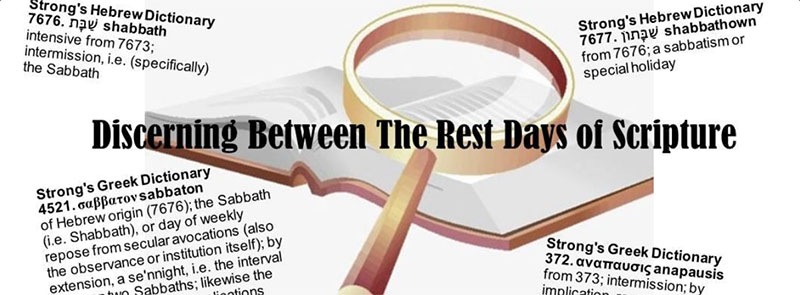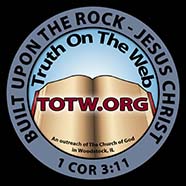
REST DAYS: Are They All Sabbaths?
BRIAN C. HOECK·TUESDAY, MAY 14, 2019Annual Sabbaths.
High Sabbaths.
Surely, you are familiar with these terms.
Funny thing is....they are not Biblical. This is an important fact that has bearing on rightly dividing the Word, so pay close attention.
Consider, for example, the instructions regarding the count to Pentecost:
The count starts “the morrow of the Sabbath,” which is translated from the Hebrew mimacharat hashabbat.
This Hebrew phrase, in truth, offers only two options (only one of which is viable):
1) The count starts the day after the Sabbath (4th Commandment), and thus, the 1st day of the week (Sunday).
2) The count starts the day after Yom Kippur.
Why do I say this?
Because the only Shabbat days in Scripture are the 7th day of the week and Yom Kippur! No other Appointed Time is called or defined as a shabbat.
But what about the first day of Chag Matzot (Feast of Unleavened Bread)? Didn’t the Pharisees argue that mimacharat hashabbat is reference to the 16th day of Nisan, and that the shabbat it speaks of is the 15th day of Nisan?
True enough, the rabbis chose for themselves to expand the Scriptural definition of shabbat to include Nisan 15 as one, but, search the Scriptures - where do we ever find the Scriptures calling it a shabbat?
The same goes for the other annual Appointed Times of Leviticus 23 -- not a single one is a Sabbath except Yom Kippur. The other rest days are not only never called Shabbat, but they have lesser restrictions than Shabbat days (which we’ll look at in a moment).
You may retort, “But, what about Yom Teruah/Day of Trumpets? My Bible says its a Sabbath. And, my Bible also refers to the 1st and 8th days of Sukkot/Feast of Tabernacles as Sabbaths too.”
It is indeed true that some English versions of Scripture give the appearance that these particular days are Sabbaths. The KJV, for example, has:
Leviticus 23:24 Speak unto the children of Israel, saying, In the seventh month, in the first day of the month, shall ye have a Sabbath, a memorial of blowing of trumpets, an holy convocation.
Leviticus 23:39 Also in the fifteenth day of the seventh month, when ye have gathered in the fruit of the land, ye shall keep a feast unto the LORD seven days: on the first day shall be a Sabbath, and on the eighth day shall be a Sabbath.
In the Hebrew Scriptures (i.e., Old Testament) however, Yom Teruah (Trumpets) and the 1st and 8th days of Tabernacles are actually designated in Hebrew as days of shabbaton. This term differs from shabbat, as does the requirements. Shabbaton days are days in which to have "holy convocations" and to "do no servile work" in them.

HEBREW SCRIPTURES - Distinguishing Shabbat and Shabbaton
The 1st and 7th days of the Feast of Unleavens and the day of Pentecost would also fit in the shabbaton category, though they are never called that in Scripture. In fact, these Appointed Times are not given any designation, but are simply referred to as days in which to have "holy convocations" and to "do no servile work" in them. Shabbat days, on the other hand, require "no manner of work" to be done in them.
The Greek OT (LXX/Septuagint) makes this same distinction between the categories of solemn rest days. The days called shabbaton in Hebrew are referred to as days of anapausis in the Greek, while the Sabbath and Atonement are referred to as Sabbata:
Leviticus 23:3 Six days shalt thou do works, but on the seventh day is the Sabbath ["Sabbata"]; a rest, a holy convocation to the Lord: thou shalt not do any work, it is a Sabbath ["Sabbata"] to the Lord in all your dwellings.
Leviticus 23:32 It shall be a holy Sabbath ["Sabbata"] to you; and ye shall humble your souls, from the ninth day of the month: from evening to evening ye shall keep your Sabbaths.
Leviticus 23:24 Speak to the children of Israel, saying, In the seventh month, on the first day of the month, ye shall have a rest ["anapausis"], a memorial of trumpets: it shall be to you a holy convocation.
Leviticus 23:39 And on the fifteenth day of this seventh month, when ye shall have completely gathered in the fruits of the earth, ye shall keep a feast to the Lord seven days; on the first day there shall be a rest ["anapausis"], and on the eighth day a rest ["anapausis"].

GREEK SCRIPTURES - Distinguishing between Sabbaton and Anapausis
In our Greek NT, the Greek term Sabbaton (not to be confused with the Hebrew shabbaton) is the word for Sabbath (or, in some instances, "week"), while the annual rest days are referred to as either heorte (festival days) or megas (high or great days).
The heorte are not Sabbaton, and the Sabbaton are not heorte.
The Scriptures also illustrate this distinction between Sabbaths and Feasts by referring to them as separate events from one another:
1 Chronicles 23:31 ...the sabbaths, in the new moons, and on the set feasts...
2 Chronicles 2:4 ...the sabbaths, and on the new moons, and on the solemn feasts...
2 Chronicles 8:13 ...on the sabbaths, and on the new moons, and on the solemn feasts...
2 Chronicles 31:3 ...the sabbaths, and for the new moons, and for the set feasts...
Nehemiah 10:33 ...the sabbaths, of the new moons, for the set feasts...
Ezekiel 45:17 ...the new moons, and in the sabbaths, in all solemnities...
Colossians 2:16 ...an holyday, or of the new moon, or of the sabbath days
Clearly, Sabbaths are separate from Feasts, and Feasts are not Sabbaths.
As evidenced in our investigation, Yom Kippur is the only “annual Sabbath.”
So, let us drop “High Sabbaths,” “Annual Sabbaths,” and other such non-biblical phrases from our vocabulary, and let’s get Biblical in all our thinking lest the thoughts of men lead us off course.
©2012, 2019 Truth On The Web Ministries

